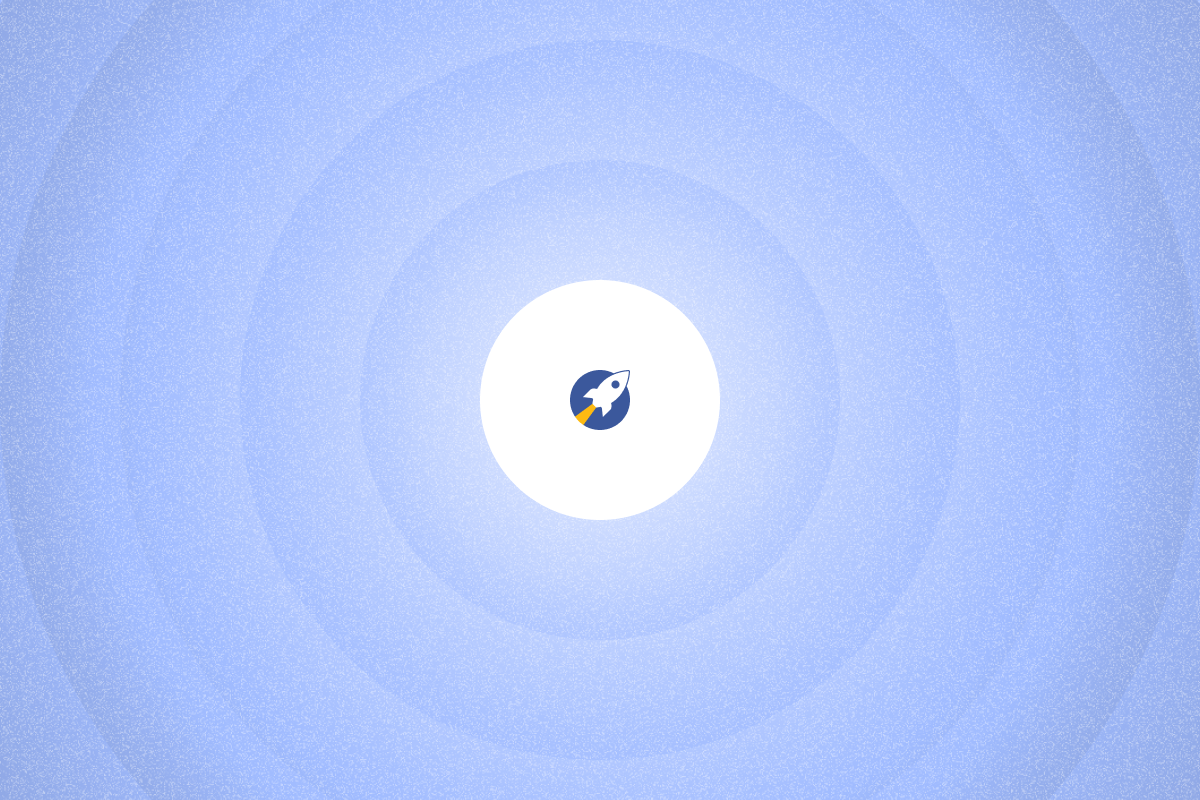Feeling limited by RocketReach’s basic automation? Many teams outgrow it when they need better targeting, flexible workflows, or richer data.
In this guide, we’ll cover 6 RocketReach alternatives built to help you scale faster with smarter lead-generation automation, stronger enrichment, and outreach.
RocketReach alternatives quick comparison
Here’s the TL;DR on what you should be looking at instead of RocketReach:
| Alternative | Best For | Key Feature | Free Trial? | Starting Price | G2 Rating | Key Advantage vs. RocketReach |
| PhantomBuster | Automated lead prospecting and enrichment | AI-powered workflows | ✅ | $56/mo | 4.4/5 | Full outreach automation across LinkedIn, email, and more |
| Cognism | B2B sales teams in regulated markets | GDPR-compliant contact data | ❌ | Custom pricing | 4.6/5 | Clean, compliant data with advanced filtering |
| ZoomInfo | Enterprise sales teams | Intent data + org charts | ❌ | $15,000/year | 4.4/5 | Enterprise-grade data enrichment and targeting |
| Apollo.io | Sales reps needing an all-in-one platform | Built-in dialer + CRM | ✅ | $49/user/mo | 4.8/5 | Combines outreach, enrichment, and CRM tools |
| Lusha | SMBs needing fast enrichment | Chrome extension for 1-click info | ✅ | $37.45/user/mo | 4.3/5 | Quick and easy enrichment without setup |
| Breeze (formerly Clearbit) | Growth marketers | Real-time web traffic reveal | ✅ | $99/mo | 4.5/5 | Great for marketing teams identifying inbound visitors |
What is RocketReach?
RocketReach is a contact lookup tool that helps you find people’s emails and phone numbers.
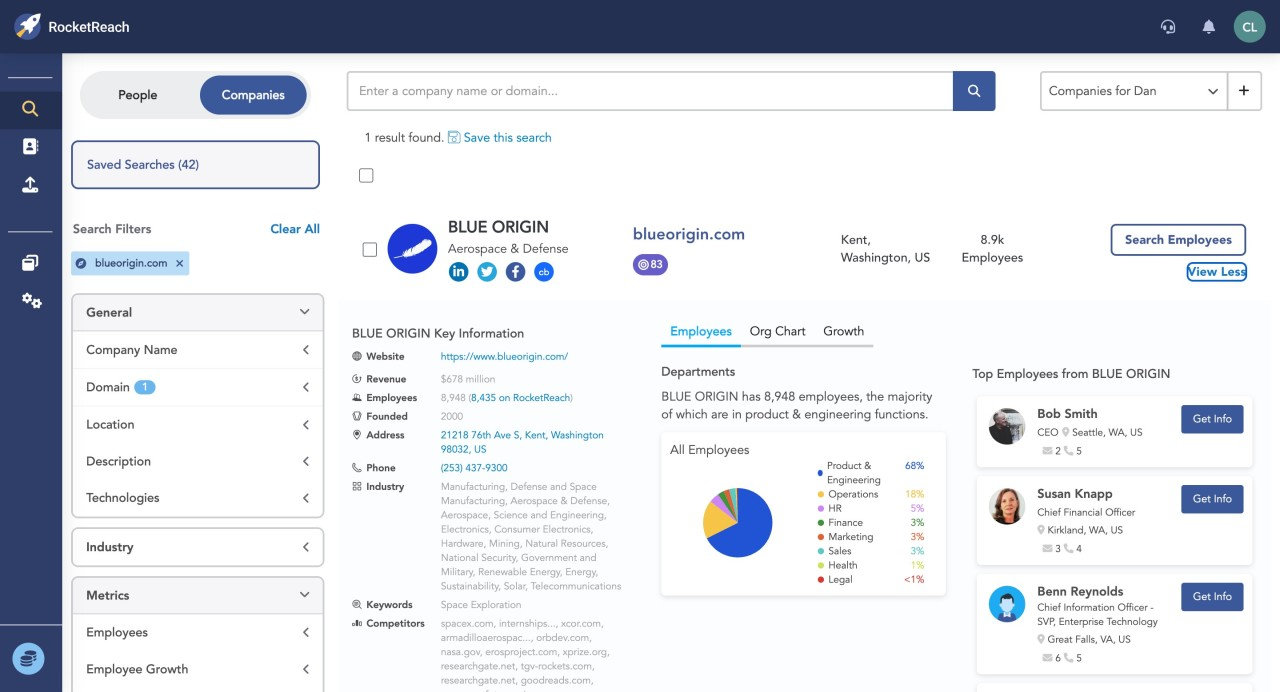
It’s been around since 2015 and has built up a database of about 700 million profiles.
Sales teams, recruiters, and marketers use it to bypass gatekeepers and reach ideal customer profiles directly.
What RocketReach offers
RocketReach is great for quickly finding contact details. It does the job if you’re looking for a straightforward way to get emails, phone numbers, and LinkedIn profiles.
Here’s what it covers:
- Verified contact data: You get access to emails, phone numbers, and social links for millions of professionals and companies.
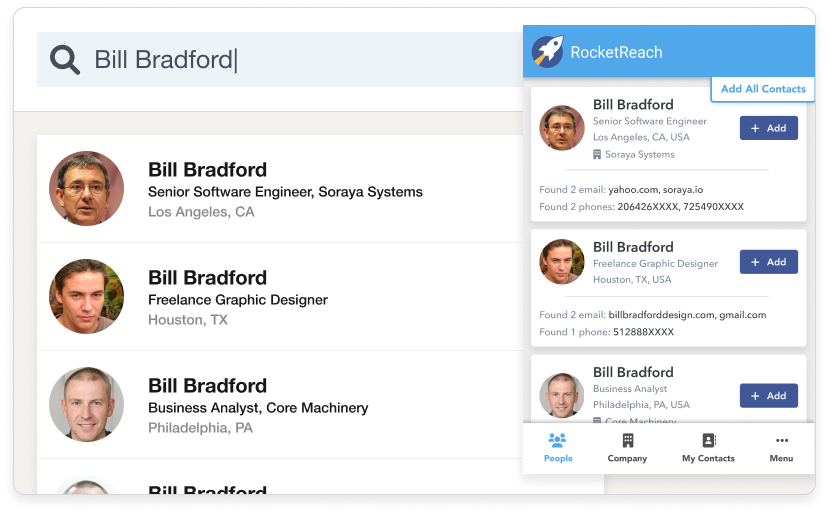
- Advanced search filters: You can refine your searches by role, company, location, and more to target the right people.
- Chrome extension: Lets you grab contact info directly from LinkedIn and other sites while browsing.
- Basic integrations: Works with tools like Salesforce and Zapier to push data into your CRM.
- Bulk lookup: Upload a list of names or domains to find contacts at scale.
RocketReach is simple and easy to use, but it might feel limiting if you need more control, automation, or sales cadence management. That’s where the next tools come in.
Why look for a RocketReach alternative?
- Basic functionality: RocketReach is good for finding a few email addresses, but might not be enough for larger B2B prospecting needs.
- Limited automation: While it provides contact information, it doesn’t automate workflows or follow-ups, which means you’ll need to do a lot of manual work to manage your outreach.
- Data quality issues: Sometimes, the data can be inconsistent, especially for areas outside the US or smaller markets. This can result in outdated contacts and lower response rates.
- Pricing structure: The pricing can increase quickly, which often means you might pay more than necessary for what you use.
- Integration limitations: It has limited integrations and a basic API, making connecting with other systems and creating custom workflows hard.
- Outdated interface: The user interface can be clunky, requiring several clicks, and doesn’t have many advanced filtering options.
Top 6 RocketReach alternatives
Now let’s talk about solutions. Here are 6 tools that will help optimize your marketing and sales efforts.
PhantomBuster: For automated lead sourcing and enrichment
If you’re serious about scaling your outreach while maintaining quality, PhantomBuster is your best bet. With a 4.4/5 rating on G2, it’s the go-to platform for teams that need to automate prospecting across multiple channels.
Unlike RocketReach’s static database, PhantomBuster lets you extract fresh, real-time social media data and automate your lead generation efforts, including enrichment and outreach.
Key features of PhantomBuster
For sales teams looking to scale their outreach without getting bogged down in manual tasks, PhantomBuster offers a way to automate the process from start to finish. It helps find leads, enrich their profiles, and send personalized messages.
The platform also makes it straightforward to use AI for things like lead scoring and enrichment. This helps teams focus their efforts on the prospects most likely to convert. As one user, Ayush S., mentioned, it’s “quick and accurate,” calling it an “indispensable tool” for outbound efforts.
Beyond automation, PhantomBuster integrates seamlessly with CRMs like Salesforce, ensuring smooth data flow across your tech stack.
Its capabilities extend across channels like LinkedIn and email, allowing for more comprehensive campaigns personalized with AI insights. Ayush S. also pointed out the wide range of prebuilt automations, highlighting their flexibility for different sales strategies.
Pros & Cons of PhantomBuster
| ✅ Pros | ❌ Cons |
| End-to-end automation from lead sourcing to outreach | Requires some setup and learning |
| Powerful AI tools for enrichment and lead scoring | Works best when your targeting and workflows are well defined |
| Supports intent-based prospecting | |
| Multichannel and customizable |
PhantomBuster pricing
PhantomBuster gives you a 14-day free trial to test everything out. Here’s what the paid plans look like:
- Start: $56/month (billed annually) or $69/month (billed monthly)—20 hours of automation, 10,000 AI credits, 5 automation slots.
- Grow: $128/month (billed annually) or $159/month (billed monthly)—40 hours of automation, 20,000 AI credits, 10 automation slots.
- Scale: $352/month (billed annually) or $439/month (billed monthly)—100 hours of automation, 50,000 AI credits, 20 automation slots.
Why switch from RocketReach to PhantomBuster?
Switching from RocketReach to PhantomBuster often comes down to wanting more than just contact lookup.
While RocketReach provides valuable contact details, PhantomBuster focuses on automating the full sequence of prospecting activities. This includes not only finding potential leads but doing so based on their recent activities and engagement, which provides much richer, more contextual data about their potential interest.
With PhantomBuster, you also use AI to personalize interactions effectively and at scale.
Besides, the platform is designed to automate these repetitive tasks and easily integrate the gathered data into your existing tech stack, like your CRM, streamlining your entire outreach and saving significant time compared to just collecting contact lists.
Cognism: For compliance-first B2B contact data
If you’re targeting European markets or working in regulated industries, Cognism should be on your radar.
With a 4.6/5 rating on G2, it’s the go-to platform for teams needing data accuracy and legal compliance.
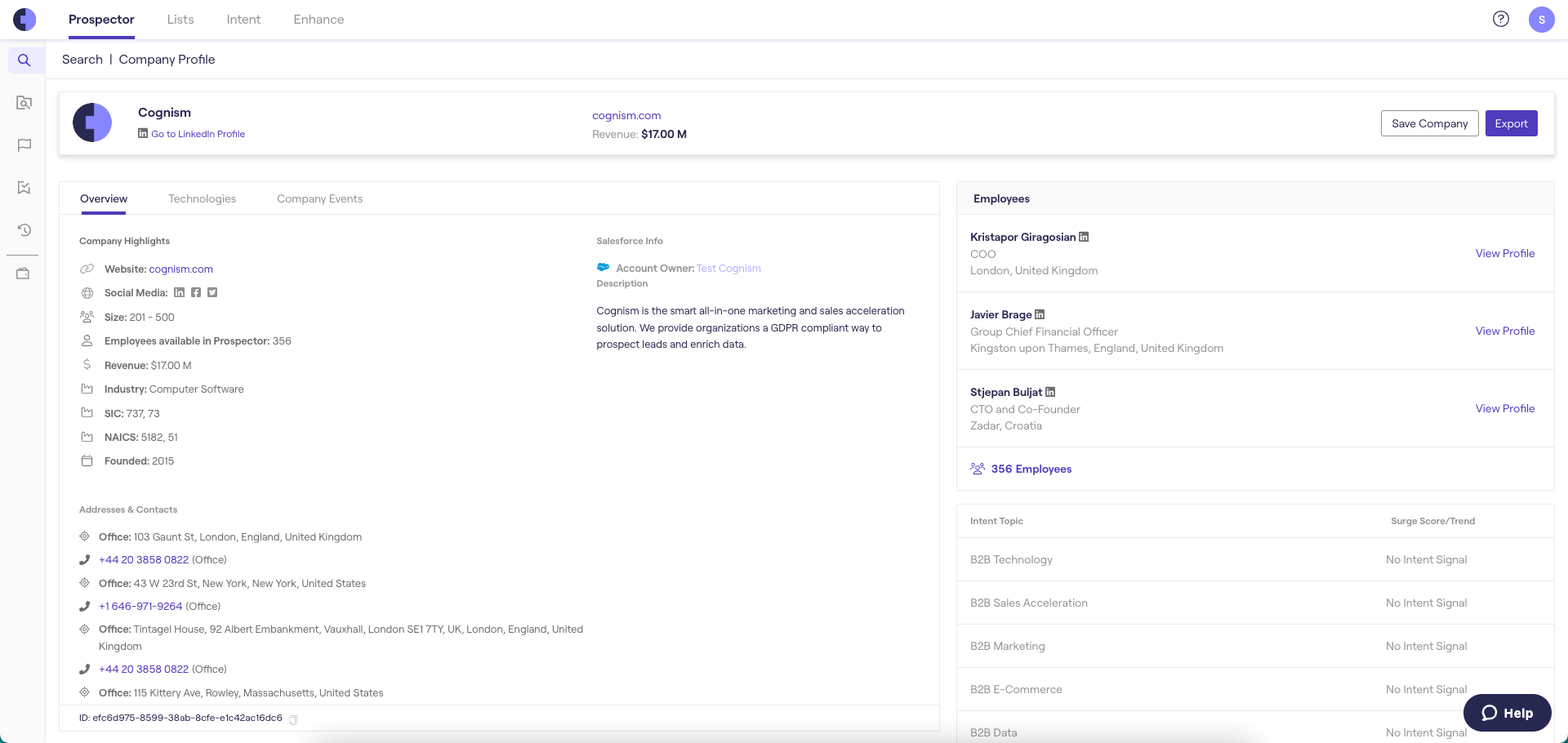
Key features of Cognism
While RocketReach effectively sources contact information, Cognism stands out because it focuses on highly accurate data and gives useful insights.
They highlight their Diamond Data®, which combines AI and human verification for reliable, GDPR-compliant contact details—a factor user Rheece S. noted significantly improved their outreach quality.
Also, Cognism equips sales teams with tools to understand the optimal timing for outreach, going beyond basic contact lists. It incorporates sales triggers and job change alerts to identify buying signals and opportune moments for engagement.
Rheece S. described this intent data as a “real game-changer” for effective timing. Coupled with its email sequencing capabilities, Cognism aims to deliver not only the contacts but also the essential context and tools needed for successful engagement.
Pros & Cons of Cognism
| ✅ Pros | ❌ Cons |
| Delivers GDPR-compliant data, ideal for prospecting in regulated markets | Pricing can be high for small teams or startups |
| Includes buyer intent data to help sales teams identify hot leads at the right time | Some reports of outdated or missing contacts in niche industries |
| Integrates with major CRMs for smooth handover to sales | |
| Strong support team and onboarding for new users |
Cognism pricing
Cognism works on a custom pricing model based on your specific needs.
While exact pricing isn’t listed on their website, reported costs range from $15,100 to $103,000 annually, depending on the plan and features. You’ll need to contact their team directly for a custom quote.
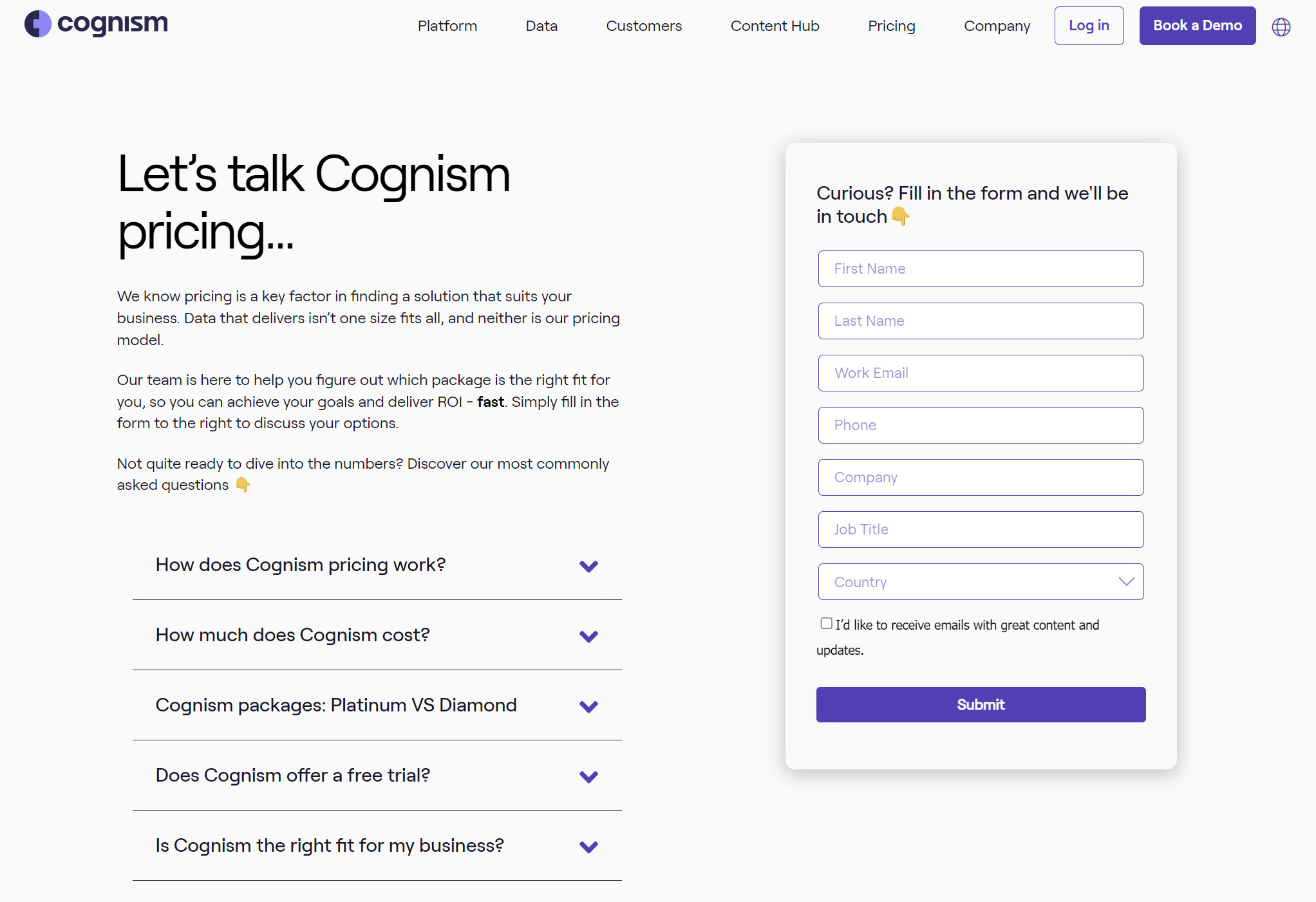
All packages offer a personalized demo to help you evaluate the fit for your business.
Why switch from RocketReach to Cognism?
Are you thinking about Cognism versus RocketReach? A key difference is Cognism’s strong focus on GDPR compliance and highly accurate, verified lead data, which aims to keep your outreach safe and effective.
Cognism also helps you reach out at smarter moments by tracking B2B buying signals like job changes. This means you get notified about timely opportunities.
Plus, unlike tools just for finding contacts, Cognism has built-in email sequencing so you can engage prospects based on these insights. And if you’re reaching out internationally, particularly in Europe, Cognism usually offers better coverage.
ZoomInfo: For deep B2B company details
ZoomInfo is the industry standard if you need the most comprehensive data, and budget isn’t your primary concern.
With a 4.5/5 rating on G2 from over 8,000 reviews, it’s the enterprise-grade solution that gives you the deepest insights into companies and decision-makers.
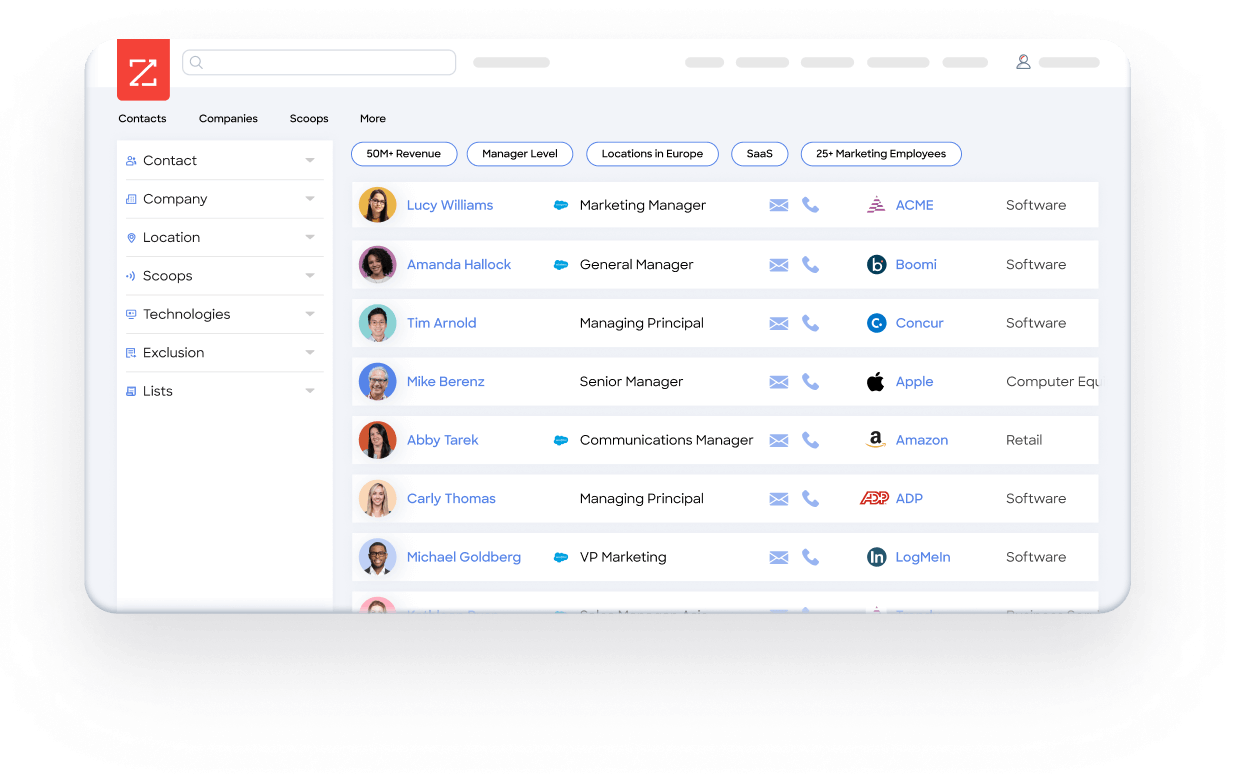
Key features of ZoomInfo
ZoomInfo goes deep on company data, providing firmographics, org charts, and intent signals to help you identify the right accounts. It also tracks which companies visit your website—a feature user Greg S. found particularly valuable for tailoring follow-up.
Beyond identifying leads, ZoomInfo includes tools like call intelligence to analyze sales calls and its Engage platform for running multi-channel outreach directly. Features like form enrichment also help streamline lead capture on your site.
Pros & Cons of ZoomInfo
| ✅ Pros | ❌ Cons |
| One of the largest B2B databases on the market | Expensive, especially for smaller teams |
| Offers powerful features like org charts and intent data | The interface can feel overwhelming at first |
| Built-in tools for enrichment, segmentation, and targeting | Some users report data accuracy issues in international markets |
| Syncs with CRMs and marketing tools to support complex workflows |
ZoomInfo pricing
ZoomInfo offers custom pricing, starting at $14,995 per year, with a minimum two-year contract.
However, you must register for a demo to get a preview and detailed pricing information.
All plans require annual commitment and typically include onboarding support to help your team maximize value.
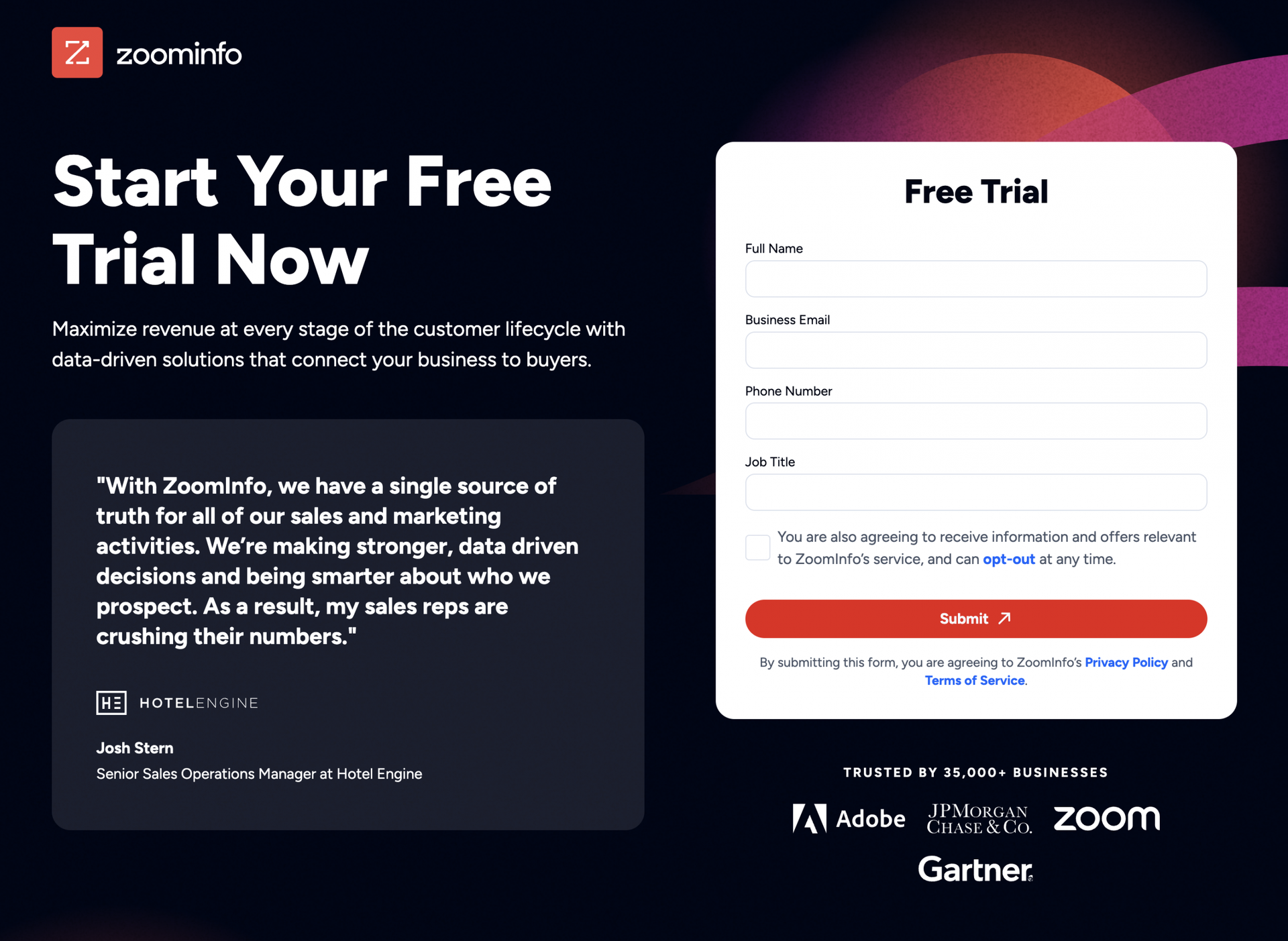
Why switch from RocketReach to ZoomInfo?
Choosing ZoomInfo over RocketReach often comes down to the need for a more comprehensive B2B database that focuses on data quality and detailed company intelligence.
ZoomInfo aims to provide a deeper understanding of target accounts beyond just contact details. This depth includes identifying buying signals, which helps you prioritize prospects showing higher conversion potential.
ZoomInfo also positions itself as an all-in-one platform, offering tools for research, outreach (like its Engage feature), and analytics within a single system.
ZoomInfo is often seen as a more suitable option for larger teams needing a robust data infrastructure to scale enterprise sales.
Apollo.io: For all-in-one sales prospecting
If you want a balance of features and affordability, Apollo.io is hard to beat.
With a stellar 4.7/5 rating on G2, it’s become a favorite for teams that need contact data and outreach capabilities without breaking the bank.
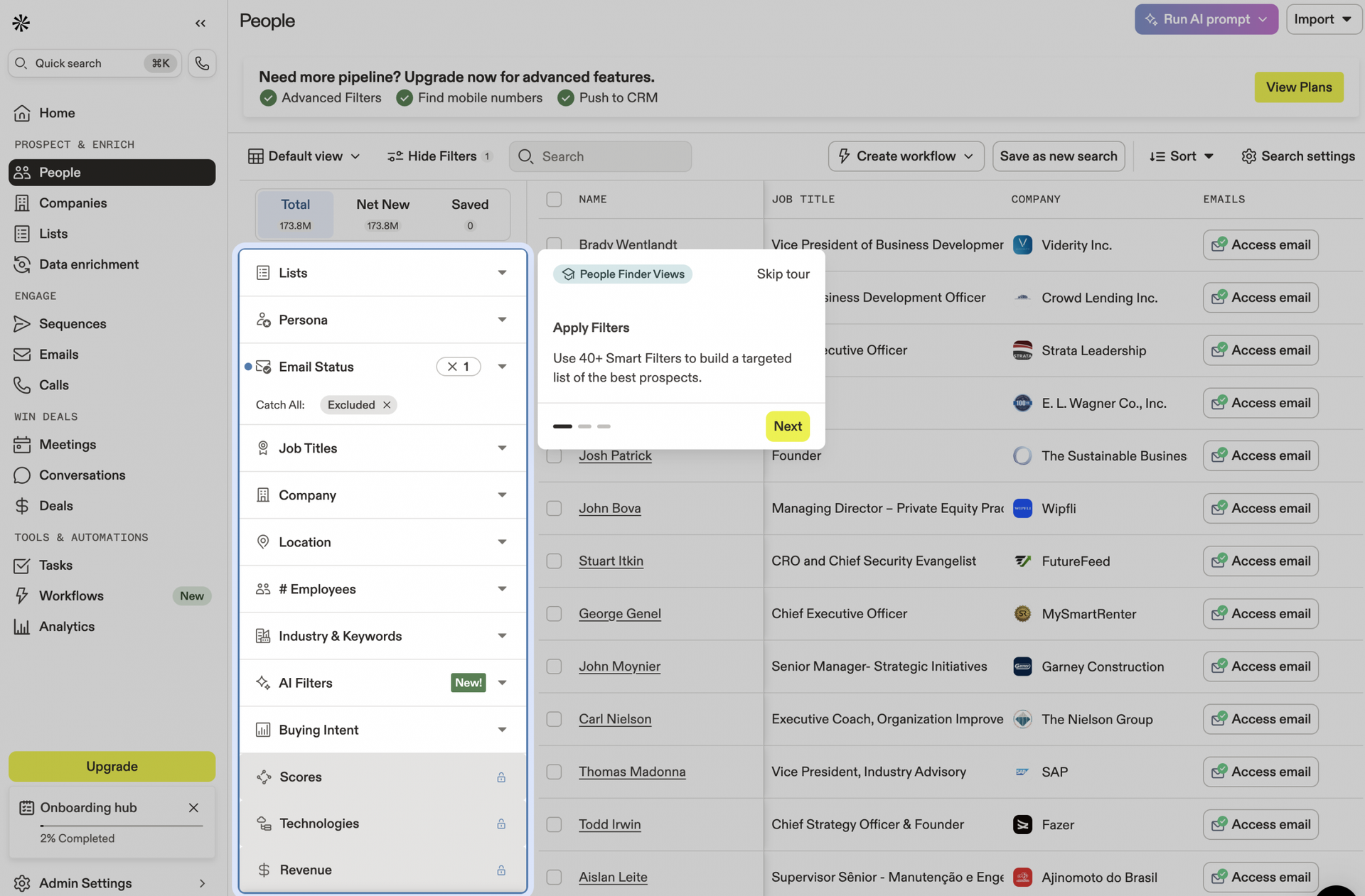
Key features of Apollo.io
Apollo.io offers an extensive contact database with over 275 million verified emails and direct dials. It is often known for being more accurate than standard contact finders like RocketReach.
It also pairs this data with advanced prospecting filters, letting you target leads based on job role, company size, tech stack, recent funding, and more. As user Bardhyl Q. noted on G2, this ability to precisely filter contacts is “particularly useful for targeted campaigns.”
Beyond finding leads, Apollo.io is more of an “all-in-one platform,” integrating outreach and analytics. Within the tool, you can build automated, multi-channel sequences that directly combine email, calls, and LinkedIn touchpoints.
Performance tracking through revenue analytics helps you see what’s working, and its native, two-way CRM integration eliminates much of the manual data entry often required when using separate tools for finding and engaging leads.
Pros & Cons of Apollo.io
| ✅ Pros | ❌ Cons |
| Combines lead database, outreach, and CRM features in one tool | The interface can feel clunky or slow at times |
| Easy to set up automated sequences for email | Customer support can be hit or miss depending on the plan |
| Large database with filters to match your ICP scoring system | Contact data accuracy can vary, especially in less active industries |
| Affordable pricing for solo users or small teams |
Apollo.io pricing
Apollo.io offers a generous free plan and scalable paid options based on your prospecting volume and automation needs:
- Free: $0—1,200 credits/year, basic filters and sequences.
- Basic: $49/month—Advanced filters, CRM sync, 60K credits/year.
- Professional: $79/month—Unlimited sequences, workflows, US dialer.
- Organization: $119/month—AI insights, international dialer, 15 mailboxes.
All paid plans include a 14-day free trial.
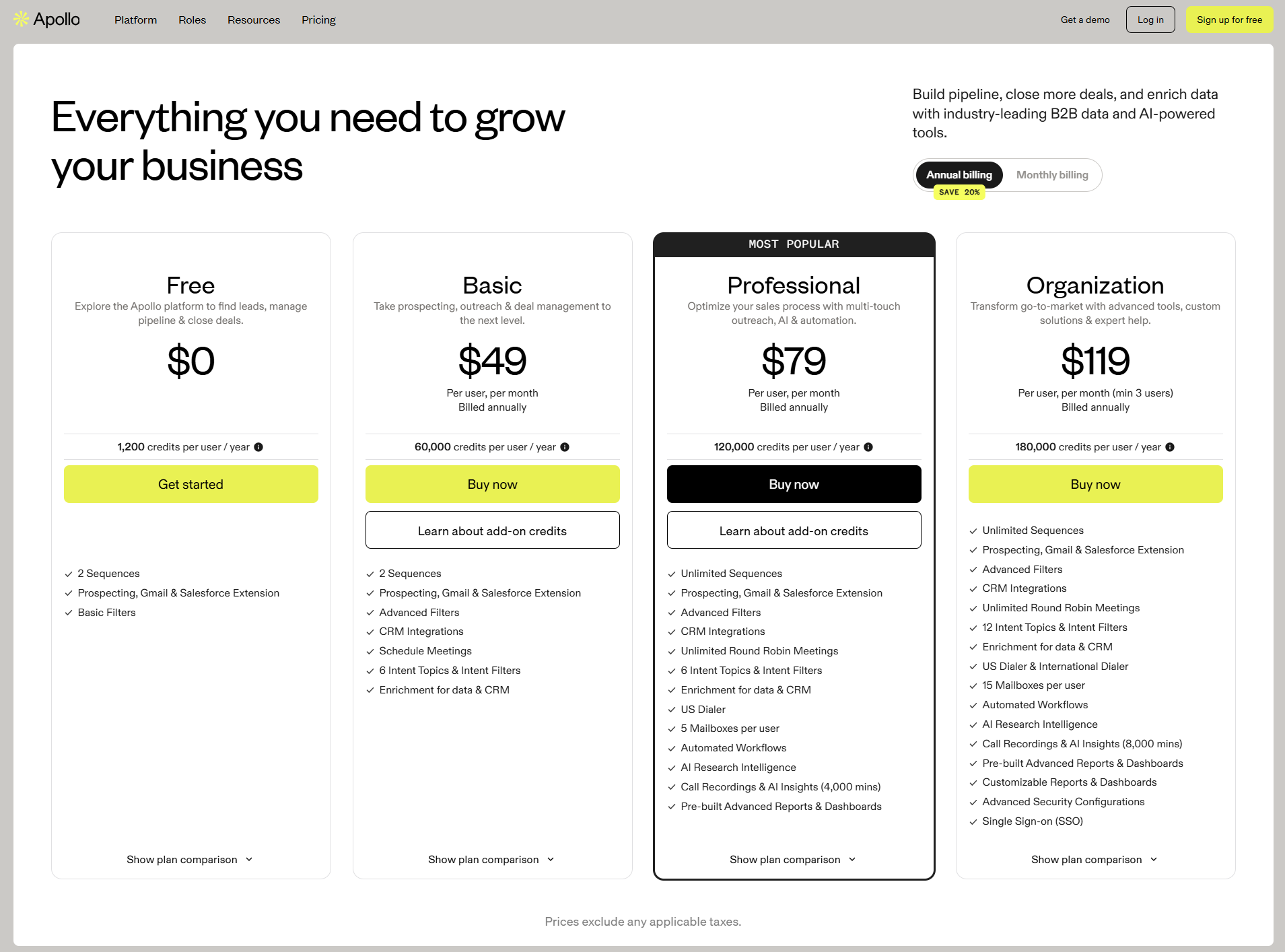
Why switch from RocketReach to Apollo.io?
If RocketReach’s contact data isn’t quite hitting the mark, Apollo.io is often highlighted for more accurate, verified information.
Beyond finding contacts, Apollo acts more like an all-in-one prospecting tool. With it, you can build and run automated outreach sequences using multiple channels, such as email and LinkedIn.
This integrated platform is generally considered intuitive to use. Plus, Apollo offers a free plan, which is handy for testing it before committing. Their pricing also tends to scale based on your usage, which can be beneficial as your needs grow.
Lusha: For fast and accurate contact data
Sometimes you just want reliable contact info without the complexity. That’s exactly what Lusha delivers.
It holds a 4.3 out of 5 rating on G2 and is a go-to for sales teams who value simplicity and accurate data that works.
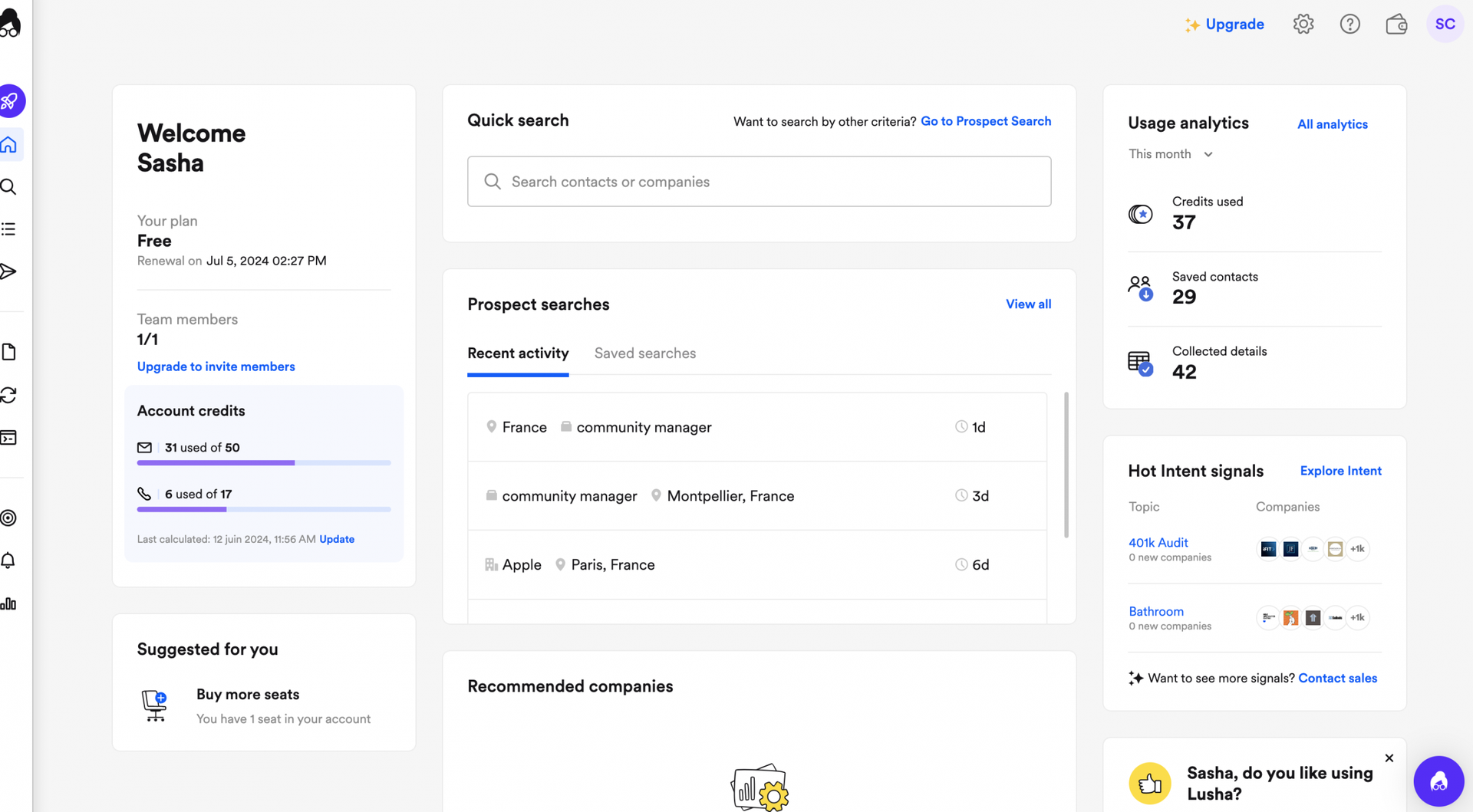
Key features of Lusha
Lusha focuses on providing accurate contact information and uses real-time verification for emails and phone numbers. This often results in higher accuracy compared to standard look-up tools like RocketReach. As user Vivek D. shared on G2, the data is “mostly accurate,” making it easier to find the right people.
A key part of Lusha is its smooth Chrome extension, which lets you grab contact details with a click while you’re on LinkedIn or company websites—often seen as quicker and more intuitive than other extensions.
Beyond the extension, Lusha also offers a prospecting platform to search for contacts using relevant filters such as industry, company size, and job title.
To keep your data organized, Lusha includes a one-click API integration. This automatically enriches and updates your CRM database in real time, helping you maintain clean and accurate records without manual uploads.
Pros & Cons of Lusha
| ✅ Pros | ❌ Cons |
| Very easy to use, even for new reps | The free plan is limited in terms of credits |
| Chrome extension makes LinkedIn prospecting fast | Sometimes lacks depth on company-level data |
| Accurate direct phone numbers and emails for many contacts | Not built for managing outreach workflows at scale |
| Solid fit for SMBs and quick outbound |
Lusha pricing
Lusha keeps it simple with a credit-based model:
- Free: 5 credits/month (5 contact details).
- Pro: $29/month per user—100 credits/month.
- Premium: $51/month per user—200 credits/month.
- Scale: Custom pricing—bulk credits and team features.
All plans include a 7-day money-back guarantee.
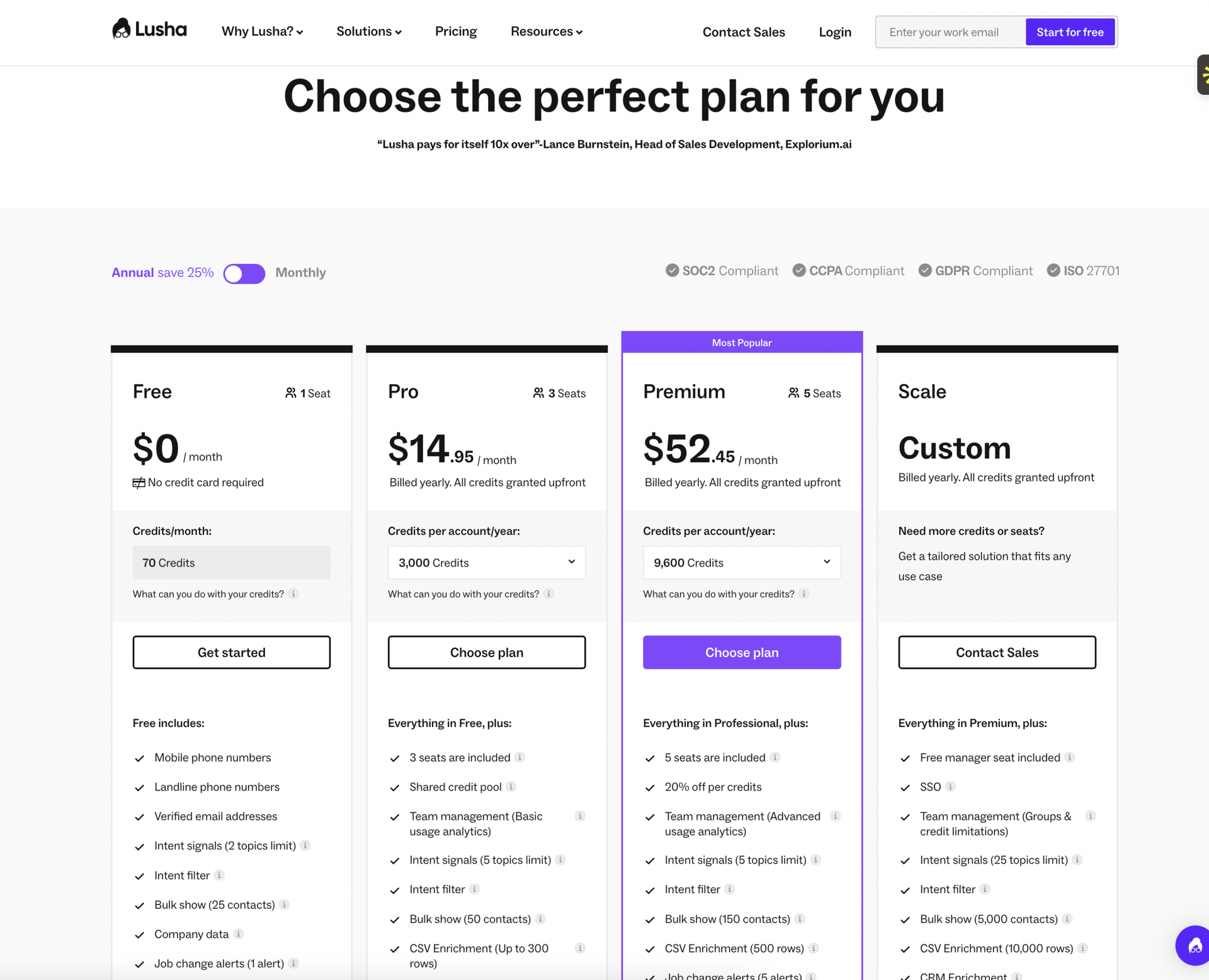
Why switch from RocketReach to Lusha?
If you’re looking for more accuracy in contact details than you might get with RocketReach, Lusha is often chosen for its freshly verified information. It focuses on providing reliable emails and phone numbers to improve your connection rates.
Many users also find Lusha simpler and more intuitive to get started with, requiring minimal training. This ease of use, combined with pricing models often allowing you to pay for the specific contacts you need, can make it an attractive option.
Plus, Lusha emphasizes compliance with data protection regulations, helping keep your outreach activities safe.
Breeze (formerly Clearbit): For AI-powered lead generation
If you want to level up your marketing-sales alignment, Breeze (the rebranded Clearbit) offers capabilities that RocketReach can’t touch.
With a 4.4/5 rating on G2, this sales intelligence platform is particularly valuable for teams focused on identifying and engaging with high-intent prospects.
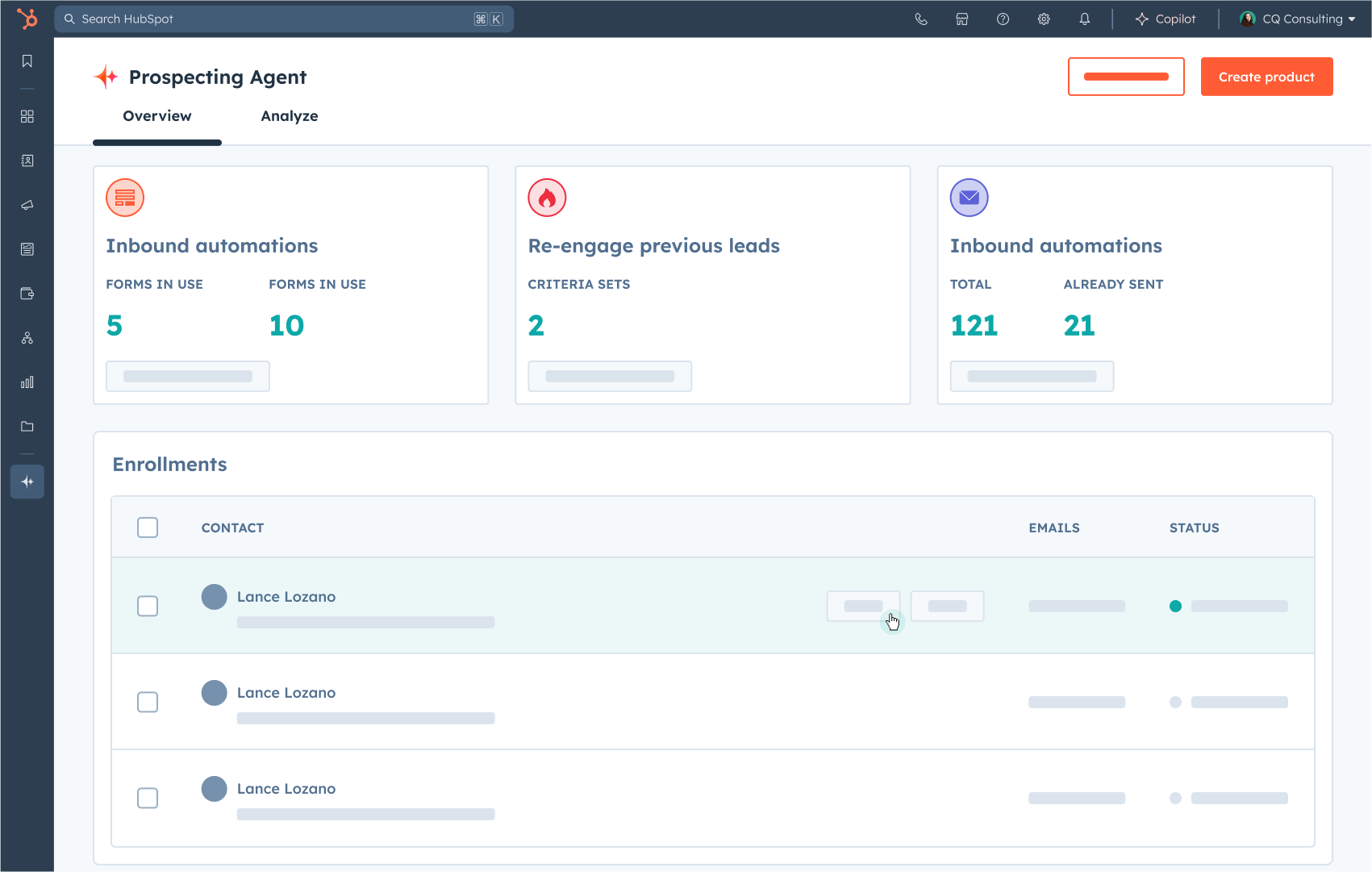
Key features of Breeze
Breeze focuses on enhancing your CRM data, automatically filling in contact and company details from its large database, keeping your records complete.
It also uses buyer intent signals to flag companies actively engaging with your brand or visiting your website, helping you spot interested prospects.
Breeze offers form shortening to improve lead capture, which pre-fills forms with known data to make converting visitors easier.
A key aspect is its seamless integration with HubSpot—it is fully embedded within the platform, eliminating the need for separate tools or complicated setups.
Breeze also includes AI capabilities to assist your teams. An AI Copilot helps with tasks like writing, summarizing, and researching directly within HubSpot. Additionally, prebuilt AI agents can generate content, write social posts, personalize outreach, and handle customer queries.
Pros & Cons of Breeze
| ✅ Pros | ❌ Cons |
| Great for marketing teams focused on inbound intent and enrichment | Best suited for marketing use cases, less for full sales workflows |
| Reveals anonymous website traffic in real-time | Custom pricing means less transparency upfront |
| Helps personalize campaigns using firmographic data | Some data gaps for smaller companies or less active domains |
| Integrates well with CRMs and tools like Segment or Marketo |
Breeze pricing
Breeze offers a simple pricing structure:
- Starter Plan: €45/month—includes 100 enrichment credits and access to HubSpot’s Starter Customer Platform.
- Custom Plans: Available for higher volumes or additional features through HubSpot.
However, Breeze requires an existing paid HubSpot product. All paid plans include a free trial period.
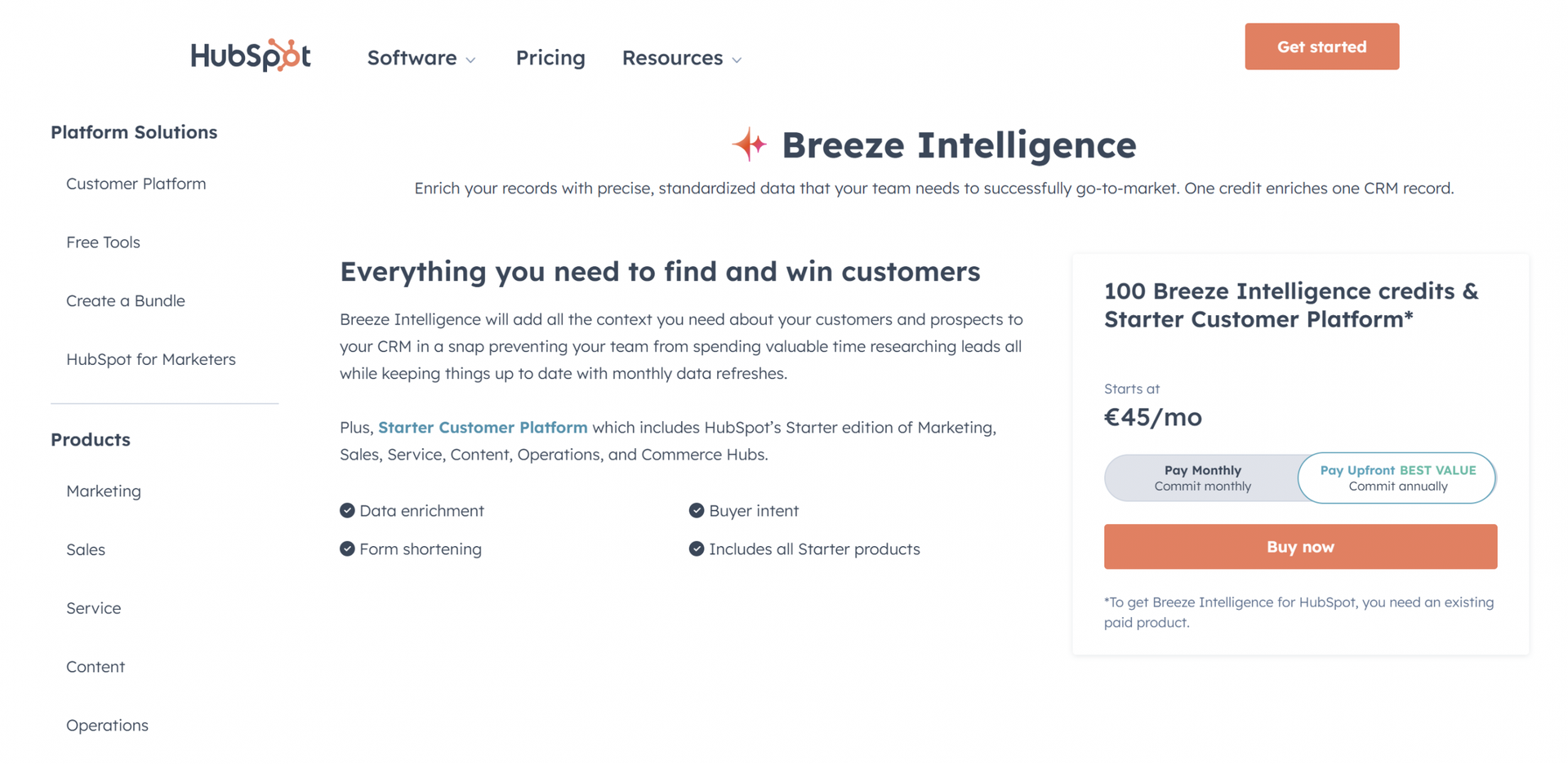
Why switch from RocketReach to Breeze?
While RocketReach helps you find contact details for individuals, Breeze focuses more on understanding which companies are interested in you by identifying anonymous website visitors who show buying intent.
It also helps enrich your existing leads with comprehensive company data, allowing for more targeted prospecting based on firmographics rather than just individual contacts.
Another key difference is Breeze’s seamless integration, particularly within platforms like HubSpot, making connecting with your marketing automation easier.
Plus, Breeze uses AI to help you identify and prioritize your most promising prospects, adding a layer of intelligence beyond basic contact lookup.
Which alternative to RocketReach is best for your sales and marketing teams?
If you want to automate outreach and enrich leads with AI, PhantomBuster is your best bet. It’s ideal for sales teams that want to scale fast with intent-based prospecting and multichannel workflows.
For verified, compliant contact data, go with Cognism. If you need deeper insights and have the budget, ZoomInfo delivers. And for a solid all-in-one platform at a lower cost, Apollo.io is a smart pick.
RocketReach alternatives FAQs
Which RocketReach alternative has the most extensive database?
ZoomInfo offers the largest B2B database, packed with firmographics, org charts, and buying signals for precise targeting.
Which RocketReach alternative offers better data accuracy?
Cognism stands out for its Diamond Data® verification process, combining AI and human checks to deliver 95%+ accuracy.
Is there a free version of RocketReach?
RocketReach doesn’t offer a free plan, but alternatives like PhantomBuster or Apollo.io include free trials or limited free tiers to get started.
What is the cheapest alternative to RocketReach?
Lusha is the most affordable paid option for individual users, starting at $36/month.
Ready to go beyond manual lookup? Start your free 14-day trial of PhantomBuster and see how automated prospecting can change how you generate leads and improve your ROI.
